Abhay Puri
Quantifying the Effect of Test Set Contamination on Generative Evaluations
Jan 07, 2026Abstract:As frontier AI systems are pretrained on web-scale data, test set contamination has become a critical concern for accurately assessing their capabilities. While research has thoroughly investigated the impact of test set contamination on discriminative evaluations like multiple-choice question-answering, comparatively little research has studied the impact of test set contamination on generative evaluations. In this work, we quantitatively assess the effect of test set contamination on generative evaluations through the language model lifecycle. We pretrain language models on mixtures of web data and the MATH benchmark, sweeping model sizes and number of test set replicas contaminating the pretraining corpus; performance improves with contamination and model size. Using scaling laws, we make a surprising discovery: including even a single test set replica enables models to achieve lower loss than the irreducible error of training on the uncontaminated corpus. We then study further training: overtraining with fresh data reduces the effects of contamination, whereas supervised finetuning on the training set can either increase or decrease performance on test data, depending on the amount of pretraining contamination. Finally, at inference, we identify factors that modulate memorization: high sampling temperatures mitigate contamination effects, and longer solutions are exponentially more difficult to memorize than shorter ones, presenting a contrast with discriminative evaluations, where solutions are only a few tokens in length. By characterizing how generation and memorization interact, we highlight a new layer of complexity for trustworthy evaluation of AI systems.
Rendering-Aware Reinforcement Learning for Vector Graphics Generation
May 27, 2025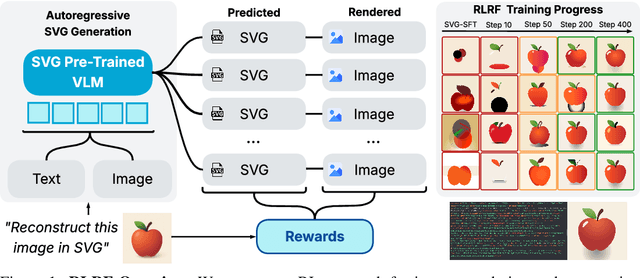
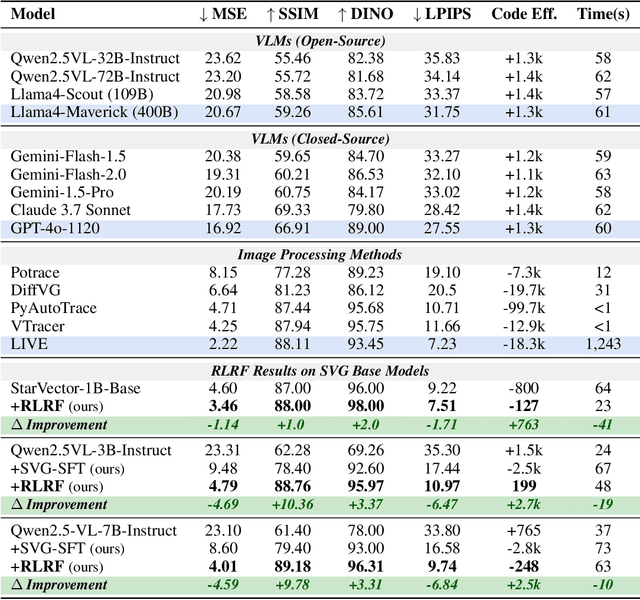

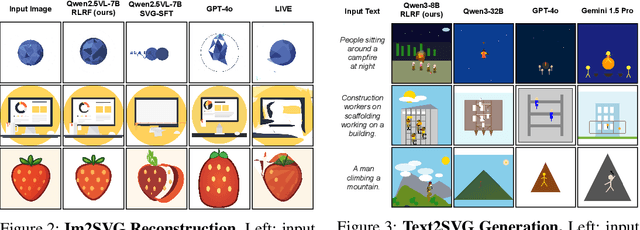
Abstract:Scalable Vector Graphics (SVG) offer a powerful format for representing visual designs as interpretable code. Recent advances in vision-language models (VLMs) have enabled high-quality SVG generation by framing the problem as a code generation task and leveraging large-scale pretraining. VLMs are particularly suitable for this task as they capture both global semantics and fine-grained visual patterns, while transferring knowledge across vision, natural language, and code domains. However, existing VLM approaches often struggle to produce faithful and efficient SVGs because they never observe the rendered images during training. Although differentiable rendering for autoregressive SVG code generation remains unavailable, rendered outputs can still be compared to original inputs, enabling evaluative feedback suitable for reinforcement learning (RL). We introduce RLRF(Reinforcement Learning from Rendering Feedback), an RL method that enhances SVG generation in autoregressive VLMs by leveraging feedback from rendered SVG outputs. Given an input image, the model generates SVG roll-outs that are rendered and compared to the original image to compute a reward. This visual fidelity feedback guides the model toward producing more accurate, efficient, and semantically coherent SVGs. RLRF significantly outperforms supervised fine-tuning, addressing common failure modes and enabling precise, high-quality SVG generation with strong structural understanding and generalization.
AlignVLM: Bridging Vision and Language Latent Spaces for Multimodal Understanding
Feb 03, 2025



Abstract:Aligning visual features with language embeddings is a key challenge in vision-language models (VLMs). The performance of such models hinges on having a good connector that maps visual features generated by a vision encoder to a shared embedding space with the LLM while preserving semantic similarity. Existing connectors, such as multilayer perceptrons (MLPs), often produce out-of-distribution or noisy inputs, leading to misalignment between the modalities. In this work, we propose a novel vision-text alignment method, AlignVLM, that maps visual features to a weighted average of LLM text embeddings. Our approach leverages the linguistic priors encoded by the LLM to ensure that visual features are mapped to regions of the space that the LLM can effectively interpret. AlignVLM is particularly effective for document understanding tasks, where scanned document images must be accurately mapped to their textual content. Our extensive experiments show that AlignVLM achieves state-of-the-art performance compared to prior alignment methods. We provide further analysis demonstrating improved vision-text feature alignment and robustness to noise.
LLMs for Literature Review: Are we there yet?
Dec 15, 2024



Abstract:Literature reviews are an essential component of scientific research, but they remain time-intensive and challenging to write, especially due to the recent influx of research papers. This paper explores the zero-shot abilities of recent Large Language Models (LLMs) in assisting with the writing of literature reviews based on an abstract. We decompose the task into two components: 1. Retrieving related works given a query abstract, and 2. Writing a literature review based on the retrieved results. We analyze how effective LLMs are for both components. For retrieval, we introduce a novel two-step search strategy that first uses an LLM to extract meaningful keywords from the abstract of a paper and then retrieves potentially relevant papers by querying an external knowledge base. Additionally, we study a prompting-based re-ranking mechanism with attribution and show that re-ranking doubles the normalized recall compared to naive search methods, while providing insights into the LLM's decision-making process. In the generation phase, we propose a two-step approach that first outlines a plan for the review and then executes steps in the plan to generate the actual review. To evaluate different LLM-based literature review methods, we create test sets from arXiv papers using a protocol designed for rolling use with newly released LLMs to avoid test set contamination in zero-shot evaluations. We release this evaluation protocol to promote additional research and development in this regard. Our empirical results suggest that LLMs show promising potential for writing literature reviews when the task is decomposed into smaller components of retrieval and planning. Further, we demonstrate that our planning-based approach achieves higher-quality reviews by minimizing hallucinated references in the generated review by 18-26% compared to existing simpler LLM-based generation methods.
BigDocs: An Open and Permissively-Licensed Dataset for Training Multimodal Models on Document and Code Tasks
Dec 05, 2024



Abstract:Multimodal AI has the potential to significantly enhance document-understanding tasks, such as processing receipts, understanding workflows, extracting data from documents, and summarizing reports. Code generation tasks that require long-structured outputs can also be enhanced by multimodality. Despite this, their use in commercial applications is often limited due to limited access to training data and restrictive licensing, which hinders open access. To address these limitations, we introduce BigDocs-7.5M, a high-quality, open-access dataset comprising 7.5 million multimodal documents across 30 tasks. We use an efficient data curation process to ensure our data is high-quality and license-permissive. Our process emphasizes accountability, responsibility, and transparency through filtering rules, traceable metadata, and careful content analysis. Additionally, we introduce BigDocs-Bench, a benchmark suite with 10 novel tasks where we create datasets that reflect real-world use cases involving reasoning over Graphical User Interfaces (GUI) and code generation from images. Our experiments show that training with BigDocs-Bench improves average performance up to 25.8% over closed-source GPT-4o in document reasoning and structured output tasks such as Screenshot2HTML or Image2Latex generation. Finally, human evaluations showed a preference for outputs from models trained on BigDocs over GPT-4o. This suggests that BigDocs can help both academics and the open-source community utilize and improve AI tools to enhance multimodal capabilities and document reasoning. The project is hosted at https://bigdocs.github.io .
InsightBench: Evaluating Business Analytics Agents Through Multi-Step Insight Generation
Jul 08, 2024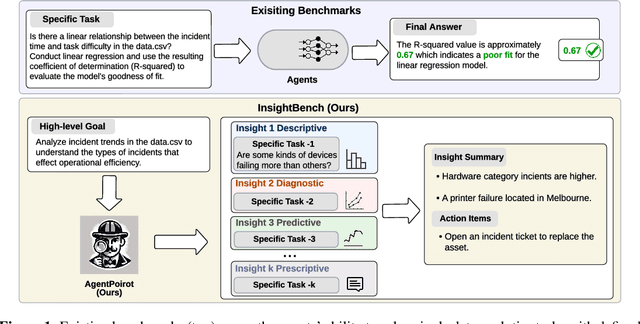
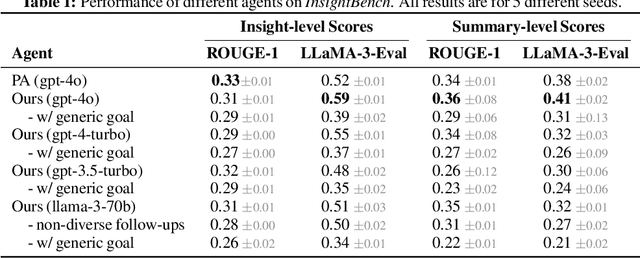

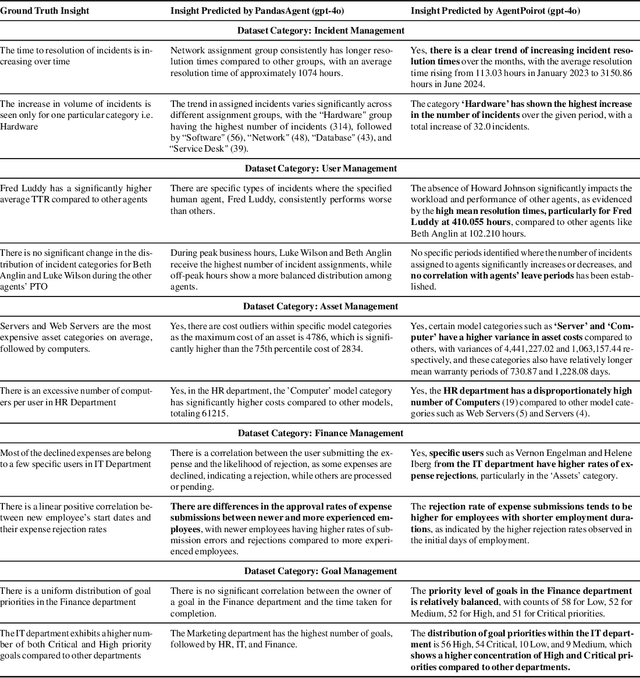
Abstract:Data analytics is essential for extracting valuable insights from data that can assist organizations in making effective decisions. We introduce InsightBench, a benchmark dataset with three key features. First, it consists of 31 datasets representing diverse business use cases such as finance and incident management, each accompanied by a carefully curated set of insights planted in the datasets. Second, unlike existing benchmarks focusing on answering single queries, InsightBench evaluates agents based on their ability to perform end-to-end data analytics, including formulating questions, interpreting answers, and generating a summary of insights and actionable steps. Third, we conducted comprehensive quality assurance to ensure that each dataset in the benchmark had clear goals and included relevant and meaningful questions and analysis. Furthermore, we implement a two-way evaluation mechanism using LLaMA-3-Eval as an effective, open-source evaluator method to assess agents' ability to extract insights. We also propose AgentPoirot, our baseline data analysis agent capable of performing end-to-end data analytics. Our evaluation on InsightBench shows that AgentPoirot outperforms existing approaches (such as Pandas Agent) that focus on resolving single queries. We also compare the performance of open- and closed-source LLMs and various evaluation strategies. Overall, this benchmark serves as a testbed to motivate further development in comprehensive data analytics and can be accessed here: https://github.com/ServiceNow/insight-bench.
 Add to Chrome
Add to Chrome Add to Firefox
Add to Firefox Add to Edge
Add to Edge